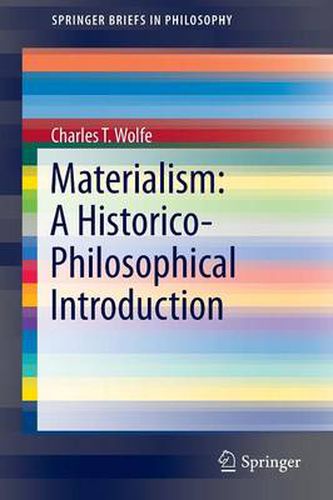Readings Newsletter
Become a Readings Member to make your shopping experience even easier.
Sign in or sign up for free!
You’re not far away from qualifying for FREE standard shipping within Australia
You’ve qualified for FREE standard shipping within Australia
The cart is loading…






This title is printed to order. This book may have been self-published. If so, we cannot guarantee the quality of the content. In the main most books will have gone through the editing process however some may not. We therefore suggest that you be aware of this before ordering this book. If in doubt check either the author or publisher’s details as we are unable to accept any returns unless they are faulty. Please contact us if you have any questions.
This book provides an overview of key features of (philosophical) materialism, in historical perspective. It is, thus, a study in the history and philosophy of materialism, with a particular focus on the early modern and Enlightenment periods, leading into the 19th and 20th centuries. For it was in the 18th century that the word was first used by a philosopher (La Mettrie) to refer to himself. Prior to that, ‘materialism’ was a pejorative term, used for wicked thinkers, as a near-synonym to ‘atheist’, ‘Spinozist’ or the delightful ‘Hobbist’. The book provides the different forms of materialism, particularly distinguished into claims about the material nature of the world and about the material nature of the mind, and then focus on materialist approaches to body and embodiment, selfhood, ethics, laws of nature, reductionism and determinism, and overall, its relationship to science. For materialism is often understood as a kind of philosophical facilitator of the sciences, and the author want to suggest that is not always the case. Materialism takes on different forms and guises in different historical, ideological and scientific contexts as well, and the author wants to do justice to that diversity. Figures discussed include Lucretius, Hobbes, Gassendi, Spinoza, Toland, Collins, La Mettrie, Diderot, d'Holbach and Priestley; Buchner, Bergson, J.J.C. Smart and D.M. Armstrong.
$9.00 standard shipping within Australia
FREE standard shipping within Australia for orders over $100.00
Express & International shipping calculated at checkout
This title is printed to order. This book may have been self-published. If so, we cannot guarantee the quality of the content. In the main most books will have gone through the editing process however some may not. We therefore suggest that you be aware of this before ordering this book. If in doubt check either the author or publisher’s details as we are unable to accept any returns unless they are faulty. Please contact us if you have any questions.
This book provides an overview of key features of (philosophical) materialism, in historical perspective. It is, thus, a study in the history and philosophy of materialism, with a particular focus on the early modern and Enlightenment periods, leading into the 19th and 20th centuries. For it was in the 18th century that the word was first used by a philosopher (La Mettrie) to refer to himself. Prior to that, ‘materialism’ was a pejorative term, used for wicked thinkers, as a near-synonym to ‘atheist’, ‘Spinozist’ or the delightful ‘Hobbist’. The book provides the different forms of materialism, particularly distinguished into claims about the material nature of the world and about the material nature of the mind, and then focus on materialist approaches to body and embodiment, selfhood, ethics, laws of nature, reductionism and determinism, and overall, its relationship to science. For materialism is often understood as a kind of philosophical facilitator of the sciences, and the author want to suggest that is not always the case. Materialism takes on different forms and guises in different historical, ideological and scientific contexts as well, and the author wants to do justice to that diversity. Figures discussed include Lucretius, Hobbes, Gassendi, Spinoza, Toland, Collins, La Mettrie, Diderot, d'Holbach and Priestley; Buchner, Bergson, J.J.C. Smart and D.M. Armstrong.